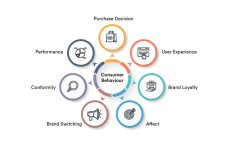Understanding consumer behavior has always been central to effective marketing. But today, with rapidly shifting digital trends, cultural values, and economic pressures, consumer behavior is evolving faster than ever. For marketers, brand managers, and business leaders, staying in tune with these changes is no longer optional—it's mission-critical.
1. From Product-Centric to Experience-Centric Thinking
Modern consumers, especially Millennials and Gen Z, aren’t just buying products—they’re buying experiences. It's no longer about what you sell, but how you sell it. Brands are investing heavily in storytelling, personalization, and community engagement to create emotionally resonant experiences. Think of Apple’s in-store vibe or Nike’s social campaigns—they’re engineered to make consumers feel something deeper than just utility.
2. The Rise of Values-Based Consumption
Today’s consumers want brands to stand for something. Whether it's sustainability, inclusivity, or ethical sourcing, people are aligning their purchases with their personal values. A Deloitte study showed that nearly 60% of Gen Z have boycotted a brand because it didn’t align with their beliefs. This shift is pushing brands to take clearer stances on social and environmental issues—or risk losing loyalty.
3. Trust is the New Currency
With fake news, data breaches, and increasing digital noise, consumers are more skeptical than ever. Trust has become a key factor in purchase decisions. Transparent communication, ethical data practices, and authentic customer service are now fundamental to winning—and keeping—consumer trust.
4. Impulse and Convenience Drive Digital Decisions
The explosion of mobile shopping, one-click purchases, and social commerce means that consumers often make decisions in seconds. This has led to the rise of micro-moments—those split seconds when a consumer turns to a device to act on a need. For marketers, the ability to show up at just the right moment (with just the right message) can be a game-changer.
5. User-Generated Content is Replacing Traditional Endorsements
Influencer marketing is evolving. Instead of polished celebrity endorsements, consumers now prefer raw, relatable content from everyday people. Reviews, unboxing videos, and customer testimonials on social media have more sway than a high-budget ad campaign. Consumers trust people like them, not just brands telling them what to believe.
6. Hyper-Personalization is the New Standard
Consumers expect brands to "know" them. From personalized emails to AI-driven product recommendations, brands are using data to deliver customized experiences. But there's a fine line—consumers also want their privacy respected. The challenge is balancing personalization with ethical data use.
Conclusion
Consumer behavior today is dynamic, complex, and emotionally driven. Brands that succeed are those that don’t just react to trends, but listen to their audience adapting messaging, products, and experiences to stay relevant and human in an increasingly digital world.
1. From Product-Centric to Experience-Centric Thinking
Modern consumers, especially Millennials and Gen Z, aren’t just buying products—they’re buying experiences. It's no longer about what you sell, but how you sell it. Brands are investing heavily in storytelling, personalization, and community engagement to create emotionally resonant experiences. Think of Apple’s in-store vibe or Nike’s social campaigns—they’re engineered to make consumers feel something deeper than just utility.
2. The Rise of Values-Based Consumption
Today’s consumers want brands to stand for something. Whether it's sustainability, inclusivity, or ethical sourcing, people are aligning their purchases with their personal values. A Deloitte study showed that nearly 60% of Gen Z have boycotted a brand because it didn’t align with their beliefs. This shift is pushing brands to take clearer stances on social and environmental issues—or risk losing loyalty.
3. Trust is the New Currency
With fake news, data breaches, and increasing digital noise, consumers are more skeptical than ever. Trust has become a key factor in purchase decisions. Transparent communication, ethical data practices, and authentic customer service are now fundamental to winning—and keeping—consumer trust.
4. Impulse and Convenience Drive Digital Decisions
The explosion of mobile shopping, one-click purchases, and social commerce means that consumers often make decisions in seconds. This has led to the rise of micro-moments—those split seconds when a consumer turns to a device to act on a need. For marketers, the ability to show up at just the right moment (with just the right message) can be a game-changer.
5. User-Generated Content is Replacing Traditional Endorsements
Influencer marketing is evolving. Instead of polished celebrity endorsements, consumers now prefer raw, relatable content from everyday people. Reviews, unboxing videos, and customer testimonials on social media have more sway than a high-budget ad campaign. Consumers trust people like them, not just brands telling them what to believe.
6. Hyper-Personalization is the New Standard
Consumers expect brands to "know" them. From personalized emails to AI-driven product recommendations, brands are using data to deliver customized experiences. But there's a fine line—consumers also want their privacy respected. The challenge is balancing personalization with ethical data use.
Conclusion
Consumer behavior today is dynamic, complex, and emotionally driven. Brands that succeed are those that don’t just react to trends, but listen to their audience adapting messaging, products, and experiences to stay relevant and human in an increasingly digital world.

